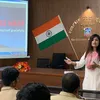How this initiative by Amway India is empowering over 3,000 women in India
Amway India’s Livelihood Enhancement programme, along with NGO Deepalaya, is empowering women with beauty and wellness, fashion designing, entrepreneurship, etc.
The plight of Indian farmers is very distressing. As per a National Sample Survey Office (NSSO) study, Situation Assessment Survey of Agricultural Households, in 2013, the average monthly income of farmers stood at Rs 6,426. In 2016-17, it reached Rs 8,931, showed a survey conducted by NABARD.
Due to this, most people migrated to cities from their villages to take up menial jobs to make ends meet.
Mamta and her family of 24 also moved to Delhi from their hometown in Uttar Pradesh. After getting married at the age of 18, Mamta could not continue her education and she could not find any job in the city.
To add to the struggles, her husband also lost his job during the pandemic, and things became all the more difficult to manage. The family was struggling with just a limited income.
At the time, Mamta came across a programme to make underprivileged women financially independent. An initiative by Amway, a global direct selling company, along with an NGO called Deepalaya, it aids in the development of urban and rural poor.
Mamta enrolled in the programme and took up a course in fashion designing. This helped her explore opportunities even during the pandemic to design and create masks, which were in much demand, and sold them in her neighbourhood.
With this, she started generating additional income to support her family. Today, Mamata has become a confident and self-reliant working woman who has gained financial independence and is an inspiration to many women in her community.

Mamta
Like Mamta, over 3,000 women have enrolled in this programme in the last three years, initiated by Amway India in association with different NGOs.
“Amway India’s Livelihood Enhancement programme was instituted in 2017 with the first phase in Bihar and Uttar Pradesh, followed by the second phase in the resettlement colonies in Delhi,” Anshu Budhraja, CEO, Amway India tells SocialStory.
He adds that the key objective is to drive entrepreneurship in underprivileged women by supporting them with the required skillsets and providing them sustainable livelihood options.
“We are training women in the age group of 18-35 with skills ranging from beauty and wellness, fashion designing, entrepreneurship, and other soft skills,” he says.
Empowering women and livelihoods
In the first phase, the pilot project began in Muzaffarpur and Chapra in Bihar and Ambedkarnagar and Mirzapur in Uttar Pradesh in association with the NGO partner Healing Fields Foundation. The objective back then was to expand community health facilitator outreach with the help of underprivileged women.
“In the second phase, we are working with NGO Deepalaya to support and empower women from underprivileged communities in resettlement colonies in Delhi to help them with the required skillsets in their entrepreneurial journey,” Anshu shares.
The focus is to equip underprivileged women with skills and help them start their own businesses or get employment.
Apart from this, the participants are also trained through specially curated workshops on nutrition and entrepreneurship.

Virtual training session for the women
“We have developed a dedicated 1,200-hour training module to support students with the required skillsets and provide sustainable livelihood options.
To further equip the students, Amway employees and Amway direct retailer/sellers also conduct virtual training sessions to acquaint them with the necessary knowledge on marketing, finance, social media related domains, etc., thus empowering them to run their enterprise more professionally.
“Additionally, we plan to support students who are keen on starting their enterprise by seed funding their business. We also plan to help them connect with banks for credit linkages for sustaining their businesses,” he says.
Amway’s CSR team and Deepalaya conceptualised, implemented, monitored, and measured the outcome of the programme in Delhi.
The NGO led the on-ground implementation by conducting virtual training sessions on topics such as nutrition, soft skills, interview skills, and the use of social media to promote business, among others.

One of the students of the fashion designing course
“We combined the information and the feedback received during surveys and on-ground education awareness sessions in the communities along with the target beneficiaries’ education level, their interest, and the demand of consumers,” says Jaswant Kaur, Executive Director of Deepalaya.
“Based on the assessments, we identified the need to provide livelihood skills in areas of beauty and wellness, fashion designing, nutrition education, and entrepreneurship,” she adds.
These students further reached out to more women sharing their first-hand experience about the programme and encouraged them to join.
Deepalaya’s team consists of four instructors along with one project coordinator and project director overlooking the on-ground activities.
“We connect with students to understand the challenges and help them overcome these challenges. Our team feels more empowered to help students run that extra mile and reach their desired goals,” says Jaswant Kaur.
Impact
Anshu says the second phase of the programme has benefited over 400 women with over 20,000 indirect beneficiaries (families of these women). Amway India will continue the programme with Deepalaya in Delhi, Sohna (Haryana), and Himachal Pradesh, and positively impact the lives of over 500 direct and 25,0000 indirect beneficiaries.
Archana, a fashion designing instructor, was happy to share that the students learnt new designs in embroidery, salwar, designer suits, etc.
“The sessions on finer aspects such as soft skills, personal grooming, customer interaction, and marketing will equip them to professionally lead their enterprises in future,” says Archana.
She adds, “During the pandemic, students also made and sold masks, which were in high demand, thus helping them generate some additional income for their families.”

Archana training the students
Challenges during the pandemic
“The project was launched two months before the pandemic. However, we had initiated groundwork to make on-ground arrangements and enrol beneficiaries. As the lockdown disrupted our lives, we faced multiple challenges to implementing the initiative,” Anshu shares.
Initially, it was difficult for the beneficiaries to adapt to the digital mode of learning. Limited access to internet and devices as well as challenges of managing household chores including medical emergencies, food requirements, childcare, etc., further added to the existing challenges around student’s education programmes.
However, Amway, along with Deepalaya, set up new processes to help students access the internet and learn apps like Zoom to stay connected and continue their training.
Deepalaya’ s teachers also worked relentlessly to counsel students and educate them on technology and applications. For their convenience, different time slots were allocated as per their schedule. Despite external challenges caused by the pandemic, the programme progressed with collaborative efforts from Amway and Deepalaya.
Talking about the road ahead, Anshu says they plan to continue nurturing this entrepreneurial spirit through tailored programmes, imparting skills required to sustain a business, while providing a community of mentors to support and guide at every step.
“In line with Government of India’s Atmanirbhar Bharat and learnings accrued from our previous projects, we aim to scale-up this initiative by adding more than 3,000 beneficiaries across different locations in India in the next couple of years,” he says.
Edited by Megha Reddy









